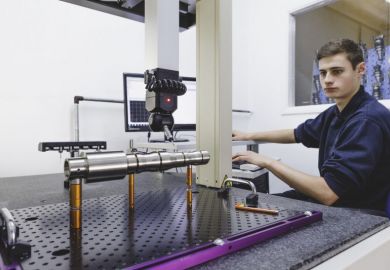It is time, the prime minister is saying, for us to get to work. And it isn’t just a question of rolling up our sleeves.
However you voted in the European Union referendum, it is clear that we are facing a momentous challenge as a nation. Can we make it on our own as a global trading nation and, if so, what will we trade? What will we make? Why should others choose to buy from us?
Some are taking inspiration from history in the nation that gave birth to the Industrial Revolution. But heritage alone won’t allow us to compete and win against Germany, South Korea, China and the US. Our industry and our country needs a new edge, and it won’t happen by accident.
Thank God that Theresa May, the UK’s new prime minister, is not someone who believes that there is no role for government in this, and she’s right.
We will be competing and trading with nations who make far weaker distinctions between the national and private interests, and who actively nurture national industrial success as part of “the defence of the realm”. If truth be told, we have decades of catching up to do compared with countries such as Germany.
But we are making a start and all agree that the preparation of people is every bit as, if not more, important to our industrial future as the cost of land or investing in equipment. Which is why, as part of the new modern industrial strategy launched this week, we’ll be working anew on the education that young people will need to be part of our future manufacturing capability.
There can be few more sacred duties than to give our children the right preparation for the challenges of life. You will note, I hope, that I have said education. Why didn’t I use the word “skills” – isn’t that what is missing from our schools and colleges? Isn’t it the problem that we value “academic” learning over the “vocational”? Aren’t we in a mess because we didn’t train enough apprentices?
Tony Blair once quipped that you could bury any awful news simply by using the word “skills” in an announcement. The real problem though was not the word, it was that we too often make a spurious split in the world by talking about skills, and the vocational versus academic worlds.
I have, in fact, spent a good deal of my time as an academic trying to explain why this terminology – and the thinking that lies behind it – is so dangerous for our country. When we teach the whole range of know-how that our children will need, we really mustn’t try to make two types of human beings: those who work with their hands and others who work with their minds.
To help get rid of this false separation, let’s think of subjects in which you wouldn’t dream of making this distinction. How about a surgeon, an architect or a musician? All areas where hand and mind must work as one, where skills and insights mesh and open new possibilities. And one more example that I know a lot about: the scientist.
When I did my training as an experimental physicist at the University of Oxford, I first finished my undergraduate degree and joined an experimental group in the Clarendon Laboratory. I quickly realised that if you want to make new and important studies of the world you have to be able to build new experimental rigs. You have to make a machine that no one has made before. It is the most wonderful of “skills”.
So I was trained to design electronic circuits, to understand the properties of materials and a lot more. I also learned how to make models of the things that I was studying using a computer, and how to explain what was going on to a sceptical audience. I needed to learn how to plan cost and get the funding for a project. And then I was fully trained and ready to run my own experimental group.
You might be thinking that only a scientist needs this sort of training. But you would be wrong. This is precisely what you need to be an engineer or a technologist working in modern industry.
Which brings me back to our prime minister’s industrial strategy. We know that there is a great shortage of engineers, and we also need to train more apprentices. That is true. But why do they have to be different types of people, one with greasy overalls and the other at a computer terminal?
I say that we can, and must, put these things together. Have more apprentices and more engineers – but without dividing them into different classes. We can give individuals the chance to decide for themselves where their future lies. I know it works because that is exactly what we are doing at the University of Sheffield, working with industry. Here’s how it started.
Our Advanced Manufacturing Research Centre works with more than 100 companies in the aerospace, automotive and energy industries. As well as our graduate engineers, we needed more technicians for the very latest kit and so we trained some of our own specialist apprentices.
These apprentices were privileged. They were soaking up the processes that would be needed in the future of manufacturing and so we found that we were training just the sort of people that our industry partners also wanted. They asked us not just for research but for some of these wonderful people. In fact, they would pay us to train the youngsters that they would employ.
So we decided to train a much larger cohort. We set about building a training centre (with government support) and a new chapter opened. Our students are able to start with the things that we can first teach in the laboratory and workshop, and progress to making computer models of the manufacturing processes that they are working on, all the time building with it the conceptual understanding of what they are learning and why it matters: hand (literal or mechanical) and mind united.
We now have nearly 600 apprentices who are doing just that. The initial response to our work speaks volumes for British culture. Instead of receiving applause, I was first asked: why is a university such as Sheffield getting involved with this low-level stuff?
But people then saw us take student apprentices from the estates of Sheffield and Rotherham and train them in one of the finest manufacturing centres in the world. They saw the enthusiastic response of local firms to these young people who could transform their productivity. The director of global manufacturing at Rolls-Royce described these wholly educated young people as “a new kind of engineer”.
People changed their minds and became our supporters.
The first cohort are now starting their foundation degree course and will progress to manufacturing engineering courses as the years proceed. They are not having a second-class education, and don’t have to choose a vocational “alternative” – they are my students, they are at university and will, one day, graduate with a degree and as much pride as anyone else.
There is a difference though. These young people are sponsored by the companies who already employ them. They will graduate with a degree recognised around the world and years of industrial experience but no debt. And they will create wealth for themselves, their community and their country.
I think that all of us can raise a glass to that!
Sir Keith Burnett is vice-chancellor of the University of Sheffield, the author of a report on The Future of Advanced Vocational Education, and a member of the prime minister’s Council on Science and Technology.
Register to continue
Why register?
- Registration is free and only takes a moment
- Once registered, you can read 3 articles a month
- Sign up for our newsletter
Subscribe
Or subscribe for unlimited access to:
- Unlimited access to news, views, insights & reviews
- Digital editions
- Digital access to THE’s university and college rankings analysis
Already registered or a current subscriber?








